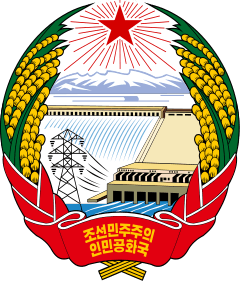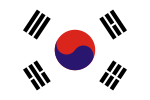People's Committee of North Korea
The People's Committee of North Korea (Chosŏn'gŭl: 북조선인민위원회) was a provisional government governing the northern portion of the Korean Peninsula from 1947 until 1948.
People's Committee of North Korea 북조선인민위원회 | |||||||||
|---|---|---|---|---|---|---|---|---|---|
| 1947–1948 | |||||||||
 Location of northern Korea | |||||||||
| Status | Unitary Marxist–Leninist provisional government | ||||||||
| Capital | Pyongyang | ||||||||
| Common languages | Korean | ||||||||
| Religion | Cheondoism, Shamanisma | ||||||||
| Government | Unitary Marxist–Leninist provisional government | ||||||||
| Chairman | |||||||||
• 1947–1948 | Kim Il-sung | ||||||||
| Legislature | People's Assembly | ||||||||
| Historical era | Cold War | ||||||||
• Established | 22 February 1947 | ||||||||
| 9 September 1948 | |||||||||
| Currency | Korean yen[2] (1946–1947) North Korean won (1947–1948) | ||||||||
| |||||||||
| People's Committee of North Korea | |
| Chosŏn'gŭl | 북조선인민위원회 |
|---|---|
| Hancha | 北朝鮮人民委員會 |
| Revised Romanization | Bukjoseon Inmin Wiwonhoe |
| McCune–Reischauer | Pukchosǒn Inmin Wiwŏnhoe |
Part of a series on the |
||||||||||||||||||||||||||||||||||||||||||
|---|---|---|---|---|---|---|---|---|---|---|---|---|---|---|---|---|---|---|---|---|---|---|---|---|---|---|---|---|---|---|---|---|---|---|---|---|---|---|---|---|---|---|
| History of North Korea | ||||||||||||||||||||||||||||||||||||||||||
 | ||||||||||||||||||||||||||||||||||||||||||
|
||||||||||||||||||||||||||||||||||||||||||
|
| ||||||||||||||||||||||||||||||||||||||||||
Established on 21 February 1947 as the successor of the de facto provisional government of the Provisional People's Committee of North Korea, the provisional government was pro-Soviet and ideologically communist. It functioned alongside the Soviet Civil Administration, which served in an advisory role to the provisional government. The committee oversaw the transition towards a communist state in the Soviet-occupied northern Korea known as the Democratic People’s Republic of Korea, which was established on 9 September 1948.
Organization
The People's Committee of North Korea was organized during the first session of the People's Assembly of North Korea held on 21–22 February 1947. The session decided to transfer the power of the Provisional People's Committee of North Korea to the People's Committee of North Korea, and elected Kim Il-sung as its chairman based on the proposal of the Democratic National United Front head Choe Yong-gon.
The People's Assembly gave authorization to Kim Il-sung to organize the People's Committee.
| Position | Name | Affiliation |
|---|---|---|
| Chairman | Kim Il-sung | Workers' Party of North Korea |
| Vice Chairmen | Kim Chaek | Workers' Party of North Korea |
| Hong Ki-ju | Democratic Party | |
| Secretary General | Han Pyong-ok | Workers' Party of North Korea |
| Planning Department | Jong Jun-taek | Workers' Party of North Korea |
| Industry Department | Ri Mun-hwan | Independent |
| Internal Affairs Department | Pak Il-u | Workers' Party of North Korea |
| Foreign Affairs Department | Ri Kang-guk | Workers' Party of South Korea |
| Finance Department | Ri Pong-su | Workers' Party of North Korea |
| Transportation Department | Ho Nam-hui | Independent |
| Agriculture and Forestry Department | Ri Sun-gun | Workers' Party of North Korea |
| Postal Service Department | Ju Hwang-sop | Chondoist Chongu Party |
| Commerce Department | Jang Si-u | Workers' Party of North Korea |
| Health Department | Ri Tong-yong | Democratic Party |
| Education Department | Han Sol-ya | Workers' Party of North Korea |
| Labor Department | O Ki-sop | Workers' Party of North Korea |
| Justice Department | Choe Yong-dal | Workers' Party of North Korea |
| Public Censorship Department | Choe Chang-ik | Workers' Party of North Korea |
| Executive Bureau | Jang Jong-sik | Workers' Party of North Korea |
| Propaganda Bureau | Ho Jong-suk | Workers' Party of North Korea |
| Food Policy Bureau | Song Pong-uk | Workers' Party of North Korea |
| General Affairs Bureau | Kim Jong-ju | Chondoist Chongu Party |
Dissolution
The Democratic People's Republic of Korea was proclaimed on September 9, 1948, effectively dissolving the provisional government. Soviet forces departed from North Korea in 1948.
See also
References
- Worldstatesmen.org - Democratic People's Republic of Korea (North Korea)
- Cho, Lee-Jay; Kim, Yoon Hyung (1995). Economic systems in South and North Korea: the agenda for economic integration. Korea Development Institute. p. 161. ISBN 978-89-8063-001-1.
.svg.png)

.svg.png)